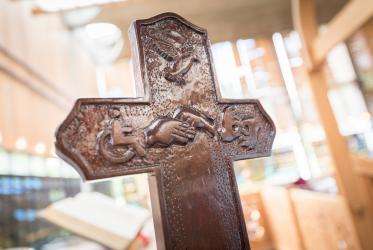Cf. WCC Press Release, PR-04-02, of 12 February 2004
Cf. WCC Press Update, UP-04-11, of 20 February 2004
Free photos and statements available: see below
Key initiatives on inter-religious dialogue and HIV/AIDS, plans for the WCC's ninth assembly, and statements on critical international situations were some of the main areas of discussion at the WCC executive committee meeting which ended in Geneva on 20 February 2004. A special ceremony and prayer service marked the formal installation of the new WCC general secretary, Rev. Dr Samuel Kobia, earlier in the week.
Among other initiatives, the committee agreed to a proposal to convene a major multi-religious international conference. It will provide an opportunity to reflect on critical issues arising from the present state of relations between religious communities as well as those challenging religious people in today’s world. According to Kobia, "Inter-religious dialogue is increasingly an imperative in our contemporary world, and will be one of the top priorities for the WCC in coming years."
WCC staff presented a special report on the Council's programmatic work on HIV/AIDS. The WCC has given high-level attention to the pandemic since 1986. In recent years, the WCC’s Ecumenical HIV/AIDS Initiative in Africa and efforts in other regions have facilitated the emergence of new church networks and multiple local initiatives, with the common purpose of countering the impact and devastation of HIV/AIDS.
The executive committee discussed preparations for the ninth assembly, to be held in Porto Alegre, Brazil, 14-23 February 2006, under the theme "God, in Your Grace, Transform the World", and voiced support for an emphasis on prayer, encounter and deliberation at the event.
Although the number of delegates will be limited to 728 (slightly more than originally planned), an open ecumenical programme will be organized alongside the formal assembly sessions to allow ecumenical partners, marginalized groups, networks and visitors to share in the event. Special attention will be given to the WCC’s Decade to Overcome Violence (2001-2010), and to the involvement of young people in all aspects of the assembly life.
The WCC is gradually moving towards a consensus method, seeking to discern the common mind in its governing and consultative bodies' meetings. The executive committee reviewed plans for new rules of procedure to cover these changes. Committee members also adopted terms of reference for an evaluation of WCC programmes, to be carried out before the ninth assembly.
In the area of public issues, the committee made a powerful plea for halting the construction of the separation wall being built by the Israeli government, and condemned its humanitarian consequences on the Palestinian population. The committee also expressed concern about renewed manifestations of anti-semitism, and asked WCC staff to develop analysis on this issue.
The committee also took action on other public issues, adopted a statement urging churches to reinvigorate efforts to prevent nuclear proliferation, reiterated its active support for renewed dialogue between the governments of India and Pakistan, and for the peaceful resolution of the conflict in Sudan.
According to a provisional financial report for 2003 presented to the committee, the WCC’s financial situation has stabilized following re-organization of staff and programme decided in late 2002. Moderator Catholicos Aram I expressed the committee’s "profound gratitude to all churches and ecumenical agencies which have continued their solidarity and support at this critical juncture in the life of the WCC".
During a festive public event of prayer and commitment on 18 February, Rev. Dr Samuel Kobia was formally installed as the new WCC general secretary. Speaking during the service, Dr Kobia committed himself to "serving the churches and the ecumenical vision… May God lead me in my new responsibility".
The executive committee will next meet in Korea in August 2004. It oversees the entire spectrum of WCC activities on behalf of the Central Committee, which is the Council's main decision-making body.
Statements on public issues are available at
www.wcc-coe.org/wcc/who/2004exco-statements.html
Free high resolution photos are available at








